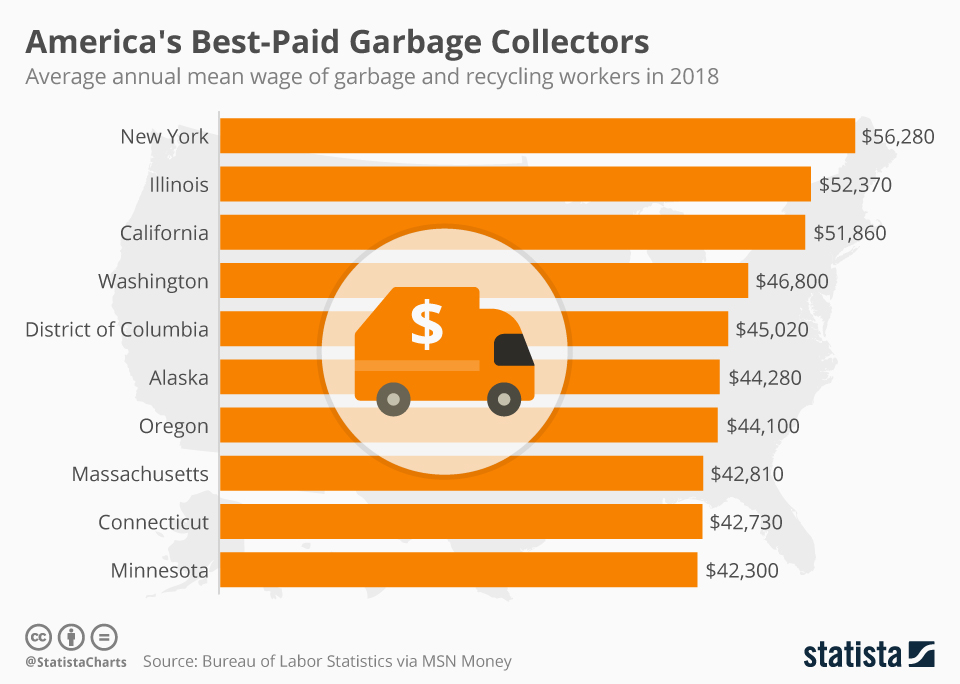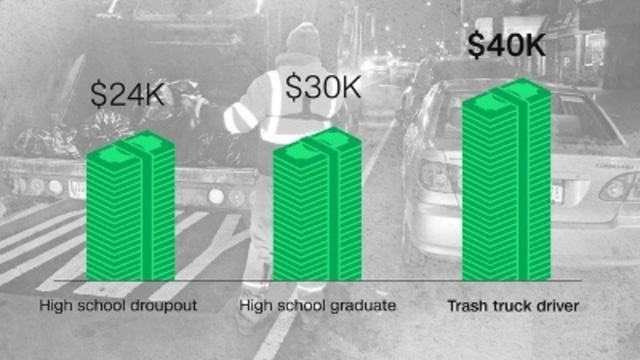Garbage men, also known as sanitation workers, make an average annual salary of $43,000 to $46,000. Despite the physically demanding and sometimes dangerous nature of the job, it is a steady and stable career path with opportunities for advancement.
Sanitation workers are responsible for collecting and disposing of garbage and recyclable materials from residential and commercial areas. They work in all weather conditions and are required to lift heavy loads and operate heavy machinery. In addition to their base salary, sanitation workers may also receive benefits such as health insurance, retirement plans, and paid time off.
Some may also have the opportunity for overtime pay. Overall, while the job of a garbage man may not be glamorous, it provides a necessary service to communities and offers a stable and decent-paying career path.

Credit: money.cnn.com
The Value Of Waste Management
Proper waste management is an essential function of any society. Garbage men, also known as waste collectors or sanitation workers, play a vital role in maintaining cleanliness and orderliness in our communities. Their work goes beyond simply collecting and disposing of garbage. In this article, we will explore the societal impact and economic importance of waste management, shedding light on the valuable contributions made by garbage men.
Societal Impact Of Garbage Collection
The efficient collection and disposal of waste have numerous positive effects on society. Here are some key societal impacts of garbage collection:
- Ensures public health and hygiene by preventing the spread of diseases and the attraction of pests
- Promotes a clean and aesthetically pleasing environment, enhancing the quality of life for residents
- Reduces pollution and environmental degradation by minimizing the release of harmful substances into the air, water, and soil
- Contributes to sustainable development by encouraging recycling and responsible waste management practices
Economic Importance Of Waste Management
Aside from its societal impact, waste management also holds significant economic importance. Here’s why:
- Generates employment opportunities: The waste management industry creates jobs for a wide range of professionals, including garbage collectors, drivers, supervisors, and administrative staff.
- Drives economic growth: Proper waste management contributes to the overall cleanliness and attractiveness of a city or town, attracting businesses, tourists, and investors.
- Promotes resource recovery and recycling: Waste management systems that prioritize recycling and resource recovery help conserve valuable materials and reduce the need for raw material extraction, leading to cost savings and environmental benefits.
- Reduces healthcare costs: Effective waste management prevents the spread of diseases, reducing the burden on healthcare systems and saving costs associated with treating preventable illnesses.
Garbage men play an integral role in waste management, ensuring that our communities remain clean, healthy, and sustainable. Their efforts not only contribute to the well-being of society but also have a positive impact on the economy. It is important to recognize and appreciate the value they bring to our daily lives.
Salary Overview For Garbage Collectors
When considering a career as a garbage collector, it’s important to understand the salary overview for this profession. Garbage men, or waste collectors, play a crucial role in keeping our communities clean and healthy. Let’s take a closer look at the salary overview for garbage collectors.
National Averages
The national average salary for garbage collectors in the United States is approximately $40,000 per year. However, this figure can vary based on several factors, including location, experience, and employer.
Factors Influencing Income
Several factors can influence the income of garbage collectors. Location is a significant factor, as urban areas tend to offer higher salaries compared to rural areas. Experience also plays a vital role, with seasoned collectors often earning higher wages. Moreover, the type of employer can impact earnings, as those working for local governments may receive different compensation compared to those employed by private waste management companies.
Regional Pay Differences
Regional pay differences impact garbage men’s salaries, with earnings varying based on location. Factors like cost of living and demand influence how much garbage men make in different regions.
Garbage men, also known as sanitation workers, play a crucial role in keeping our communities clean and healthy. However, the salary of a garbage man can vary significantly depending on the region they work in. Let’s explore the regional pay differences in this profession and understand how location can impact their earnings.
Top Paying States
How Much Do Garbage Men Make? The salary of garbage men can vary greatly from state to state within the United States. Some states offer higher compensation for these essential workers. Here are the top paying states for garbage men:
| State | Average Annual Salary |
|---|---|
| Texas | $45,000 |
| California | $43,000 |
| New York | $41,000 |
Please note that these figures are approximate and can vary based on factors such as experience, qualifications, and specific job responsibilities.
Rural Vs. Urban Salaries
Another important aspect to consider when discussing regional pay differences for garbage men is the distinction between rural and urban areas. In general, garbage men in urban areas tend to earn higher salaries compared to their counterparts in rural areas. This can be attributed to the higher cost of living and increased demand for sanitation services in densely populated cities. However, it’s essential to note that the cost of living can also be higher in urban areas, which can offset the higher salaries. Garbage men working in rural areas may enjoy a lower cost of living, which can contribute to a higher standard of living despite potentially lower salaries.
In conclusion, regional pay differences in the garbage men profession can be significant. Top paying states such as Texas, California, and New York offer higher salaries, while urban areas generally provide better compensation than rural areas. It’s important for individuals considering a career as a garbage man to research the specific region they plan to work in and understand the associated salary expectations.

Credit: money.cnn.com
Experience And Earnings
Garbage men, also known as sanitation workers, typically earn around $30,000 to $60,000 annually. Salaries can vary based on location, experience, and company benefits. With on-the-job training, these essential workers play a crucial role in keeping communities clean and safe while earning a decent income.
Entry-level Wages
When starting out in the waste management industry, aspiring garbage men can expect to earn modest entry-level wages. The exact amount can vary depending on the location and company, but on average, entry-level garbage collectors earn around $15 to $20 per hour. These positions often require minimal experience or educational qualifications, making them accessible to individuals looking to enter the workforce.
Salary Growth Over Time
As garbage men gain more experience and tenure in their roles, their earnings have the potential to increase significantly. With time, they can progress to higher-paying positions within the waste management industry. For example, garbage truck drivers or supervisors may earn higher salaries due to the added responsibilities and specialized skills required.
Let’s take a look at the potential salary growth over time for garbage men:
| Years of Experience | Salary Range |
|---|---|
| 1-5 years | $20,000 – $30,000 per year |
| 5-10 years | $30,000 – $40,000 per year |
| 10+ years | $40,000+ per year |
Please note that these figures are approximate and can vary based on factors such as location, company size, and employee benefits. It’s also important to consider that salary growth may not solely rely on experience but can also be influenced by additional qualifications, promotions, and advancements within the industry.
In conclusion, while entry-level wages for garbage men may be modest, the potential for salary growth over time exists. With dedication, experience, and opportunities for advancement, garbage men can increase their earnings and potentially achieve a stable and rewarding career in the waste management field.
Benefits And Perks
When considering a career as a garbage collector, it’s essential to factor in the benefits and perks that come with the job. Garbage men, also known as waste management workers, enjoy a range of advantages that contribute to their overall job satisfaction and financial security. Let’s delve into the various benefits and perks that garbage men typically receive.
Health And Retirement Benefits
Garbage men often receive comprehensive health insurance plans that cover medical, dental, and vision expenses. This ensures that they have access to quality healthcare services, promoting their well-being and peace of mind. Additionally, many waste management companies offer retirement plans, such as 401(k) or pension schemes, enabling garbage men to build a secure financial future for their post-working years.
Additional Incentives
In addition to health and retirement benefits, garbage men may receive various other incentives. These can include paid time off, such as vacation days and sick leave, providing them with the opportunity to rest and recharge. Some waste management companies also offer educational assistance programs, allowing garbage men to pursue further studies and skill development, enhancing their career prospects.

Credit: www.statista.com
Union Representation Impact
Union representation has a significant impact on the wages and working conditions of garbage men. Let’s explore how being part of a union can influence their earnings and overall job benefits.
Union Vs. Non-union Wages
Garbage men who are part of a union tend to earn higher wages compared to their non-union counterparts. The collective bargaining power of the union enables them to negotiate for better pay and benefits.
Collective Bargaining Advantages
Being part of a union allows garbage men to engage in collective bargaining, which means they can negotiate as a group with their employers. This often leads to improved wages, healthcare coverage, retirement benefits, and safer working conditions.
Education And Training Investment
Garbage men, or waste collectors, typically earn an average annual salary of around $40,000, with the potential for higher earnings as they gain experience and take on specialized roles. Their income is influenced by factors such as location, employer, and overtime opportunities, making it a viable career path for those seeking stable employment with room for growth.
Required Qualifications
Garbage men are required to have a high school diploma or GED.
On-the-job Training
Garbage men receive on-the-job training to learn proper waste collection procedures.
Future Outlook For Garbage Collectors
Garbage collectors, also known as sanitation workers, earn a median annual wage of around $37,840, with the top 10% making over $63,660. The demand for these essential workers is expected to remain steady in the coming years, providing stable employment opportunities and potential for growth in this field.
Advancements In Waste Management
As we look into the future outlook for garbage collectors, it is essential to consider the industry growth projections and advancements in waste management that will shape their roles and earnings.
Industry Growth Projections
- Garbage collection industry expected to grow steadily.
- Increased focus on environmental sustainability driving demand.
- Job opportunities likely to expand in urban areas.
Advancements In Waste Management
- New technologies improving garbage collection efficiency.
- Automation reducing manual labor requirements.
- Green initiatives leading to more specialized roles.
With these developments, the future for garbage collectors appears promising with increased job opportunities and the adoption of advanced technologies enhancing their work environment.
Frequently Asked Questions
How Much Do Garbage Men Make On Average?
Garbage men, also known as sanitation workers, make an average salary of around $40,000 to $50,000 per year. However, salaries can vary depending on factors such as location, experience, and union agreements.
Do Garbage Men Get Benefits?
Yes, garbage men typically receive benefits such as health insurance, retirement plans, and paid time off. These benefits can vary depending on the employer and union agreements.
What Kind Of Training Do Garbage Men Need?
Garbage men usually need a high school diploma or GED. On-the-job training is provided by employers and may include learning how to operate equipment, safety procedures, and waste management regulations.
Is Being A Garbage Man A Dangerous Job?
Garbage collection can involve heavy lifting, working with potentially hazardous materials, and operating large machinery. However, with proper training and safety protocols, the job can be performed safely.
Conclusion
The earnings of garbage men vary based on location and experience. Understanding the factors influencing their pay is essential for those considering this career path. By conducting thorough research and staying informed, individuals can make informed decisions regarding this profession.
Ultimately, garbage men play a crucial role in society and deserve fair compensation.


